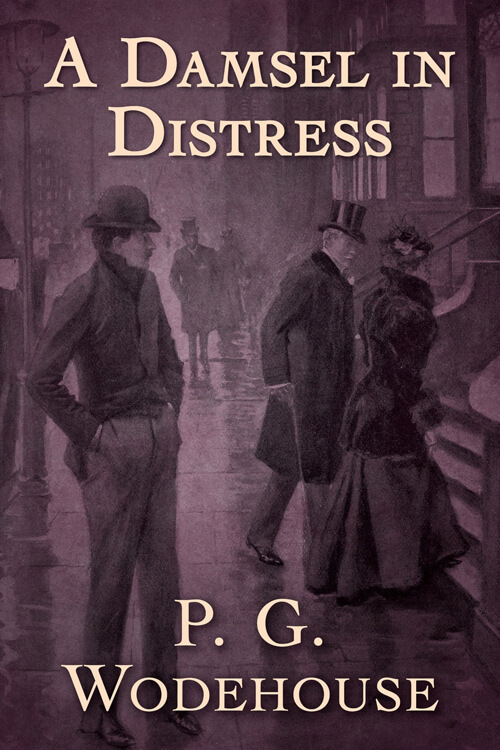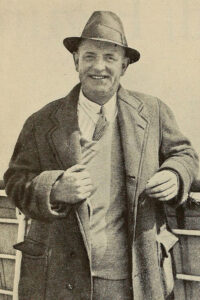
A Damsel in Distress
Since the scene of this story is that historic pile, Belpher Castle, in the county of Hampshire, it would be an agreeable task to open it with a leisurely description of the place, followed by some notes on the history of the Earls of Marshmoreton, who have owned it since the fifteenth century. Unfortunately, in these days of rush and hurry, a novelist works at a disadvantage. He must leap into the middle of his tale with as little delay as he would employ in boarding a moving tramcar. He must get off the mark with the smooth swiftness of a jackrabbit surprised while lunching. Otherwise, people throw him aside and go out to picture palaces.
I may briefly remark that the present Lord Marshmoreton is a widower of some forty-eight years: that he has two children—a son, Percy Wilbraham Marsh, Lord Belpher, who is on the brink of his twenty-first birthday, and a daughter, Lady Patricia Maud Marsh, who is just twenty: that the chatelaine of the castle is Lady Caroline Byng, Lord Marshmoreton’s sister, who married the very wealthy colliery owner, Clifford Byng, a few years before his death (which unkind people say she hastened): and that she has a step-son, Reginald. Give me time to mention these few facts and I am done. On the glorious past of the Marshmoretons, I will not even touch.
Luckily, the loss of literature is not irreparable. Lord Marshmoreton himself is engaged in a history of the family, which will doubtless be on every bookshelf as soon as his lordship gets it finished. And, as for the castle and its surroundings, including the model dairy and the amber drawing room, you may see them for yourself any Thursday, when Belpher is thrown open to the public on payment of a fee of one shilling a head. The money is collected by Keggs the butler and goes to a worthy local charity. At least, that is the idea. But the voice of calumny is never silent, and there exists a school of thought, headed by Albert, the page-boy, which holds that Keggs sticks to these shillings like glue, and adds them to his already considerable savings in the Farmers’ and Merchants’ Bank, on the left side of the High Street in Belpher village, next door to the Oddfellows’ Hall.
About this, one can only say that Keggs looks far too much like a particularly saintly bishop to indulge in any such practices. On the other hand, Albert knows Keggs. We must leave the matter open.
Of course, appearances are deceptive.
Read or download Book
Pelham Grenville Wodehouse
Sir Pelham Grenville Wodehouse, KBE (15 October 1881 – 14 February 1975) was an English writer and one of the most widely read humorists of the 20th century.
Biography.
His creations include the feather-brained Bertie Wooster and his sagacious valet, Jeeves; the immaculate and loquacious Psmith; Lord Emsworth and the Blandings Castle set; the Oldest Member, with golf stories; and Mr Mulliner, with tall tales on subjects ranging from bibulous bishops to megalomaniac movie moguls.
Born in Guildford, the third son of a British magistrate based in Hong Kong, Wodehouse spent happy teenage years at Dulwich College, to which he remained devoted all his life. After leaving school he was employed by a bank but disliked the work and turned to write in his spare time. His early novels were mostly school stories, but he later switched to comic fiction. Most of Wodehouse’s fiction is set in his native United Kingdom, although he spent much of his life in the US and used New York and Hollywood as settings for some of his novels and short stories. He wrote a series of Broadway musical comedies during and after the First World War, together with Guy Bolton and Jerome Kern, that played an important part in the development of the American musical. He began the 1930s writing for MGM in Hollywood. In a 1931 interview, his naive revelations of incompetence and extravagance in the studios caused a furor. In the same decade, his literary career reached a new peak.
In 1934 Wodehouse moved to France for tax reasons; in 1940 he was taken prisoner at Le Touquet by the invading Germans and interned for nearly a year. After his release, he made six broadcasts from German radio in Berlin to the US, which had not yet entered the war. The talks were comic and apolitical, but his broadcasting over enemy radio prompted anger and strident controversy in Britain and a threat of prosecution. Wodehouse never returned to England. From 1947 until his death he lived in the US, taking dual British-American citizenship in 1955. He died in 1975, at the age of 93, in Southampton, New York, one month after he was awarded a knighthood of the Order of the British Empire (KBE).
Wodehouse was a prolific writer throughout his life, publishing more than ninety books, forty plays, two hundred short stories, and other writings between 1902 and 1974. He worked extensively on his books, sometimes having two or more in preparation simultaneously. He would take up to two years to build a plot and write a scenario of about thirty thousand words. After the scenario was complete he would write the story. Early in his career, Wodehouse would produce a novel in about three months, but he slowed in old age to around six months. He used a mixture of Edwardian slang, quotations from and allusions to numerous poets, and several literary techniques to produce a prose style that has been compared to comic poetry and musical comedy. Some critics of Wodehouse have considered his work flippant, but among his fans are former British prime ministers and many of his fellow writers.






